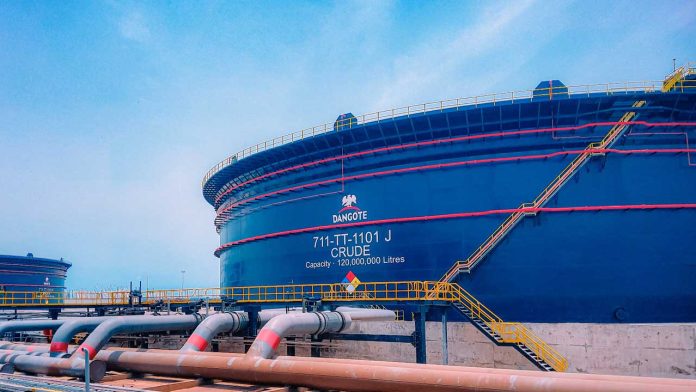The Federal Executive Council has approved President Tinubu’s proposal to sell crude oil to Dangote Refinery and other upcoming refineries in Naira. This directive includes not only the sale of crude oil to Dangote Refineries but also extends to the sale of Dangote’s products to others, all transactions conducted in Naira.
Currently, Dangote Refinery requires 15 cargoes of crude annually, amounting to $13.5 billion. NNPC Limited has committed to supplying four of these cargoes. Under the new directive, 450,000 barrels of crude earmarked for domestic consumption will be sold to Nigerian refineries in Naira, with Dangote Refinery serving as the pilot for this initiative. The exchange rate will be fixed for the duration of the transaction.
African Export-Import Bank (Afreximbank) and other Nigerian settlement banks will facilitate the trade between Dangote Refinery and NNPC Limited. This intervention aims to eliminate the need for international letters of credit and is expected to save the country billions of dollars currently spent on importing refined fuel.
This policy is a welcome development, anticipated to ease pressure on Nigeria’s FX reserves and reduce monthly FX expenditure on petroleum products from approximately $660 million to $50 million, totaling $7.92 billion annually. This marks a 94 percent reduction, saving $7.32 billion. The policy will also lower finance costs, which currently stand at $79 million, associated with opening letters of credit between local refineries.
Technically, the government is offering local refineries a production subsidy, which would favor modular refineries more than Dangote Refinery due to their smaller capacity. However, NNPC will start with Dangote Refinery before extending to other refineries. NNPC Limited has committed to supplying four cargoes to Dangote Refinery while Dangote looks elsewhere to source the remaining cargoes.
The current oil production level makes it challenging for the government to supply Dangote with 15 cargoes of crude annually. To address this, lawmakers should consider amending Section 109 of the PIA, related to guaranteeing feedstock to refiners, and introduce backward integration programs to help refiners invest in onshore fields. This would ensure a steady supply of crude oil to local refineries, increase Nigeria’s oil production, attract more Foreign Direct Investments into Nigeria’s oil sector, and alleviate the government’s burden.
Nurudeen Adeyemi




